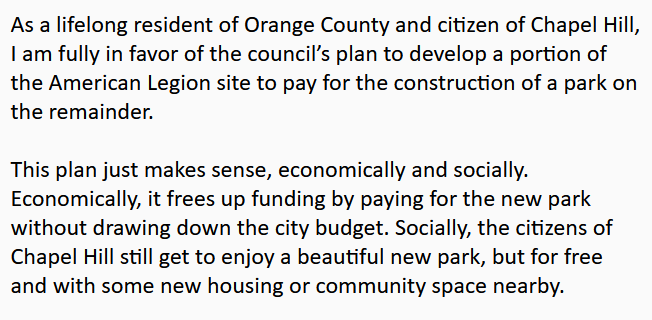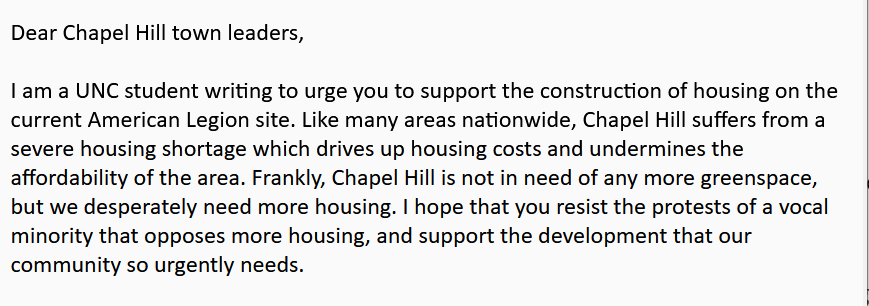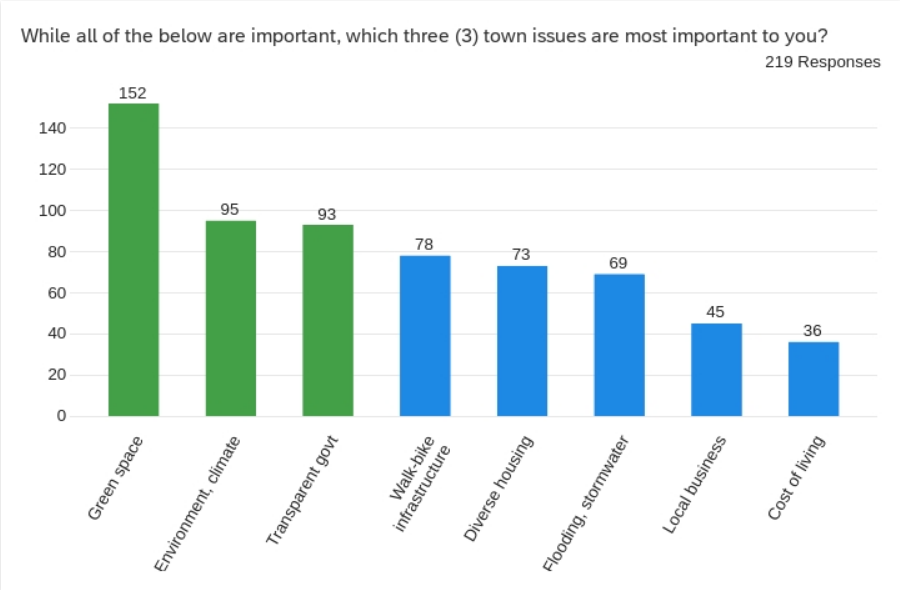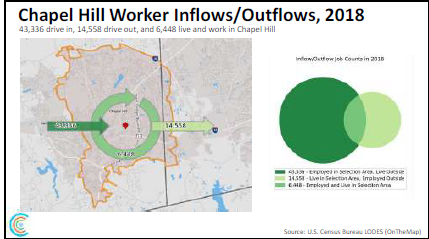We woke up to find many responses to our Twitter thread from yesterday on plans to
1) build a park and
2) add much-needed missing middle housing to our town.
Let’s examine some of the responses, shall we?
First, we should say that anyone can write to the mayor and town council — and everyone can see all of the responses. Their email is [email protected] and their inbox is here: https://councilmail.townofchapelhill.org
We have been happy to see so many people writing to council in support of five councilmembers’ petition to 1) build a park and 2) add much needed housing. It’s clear that this issue is bringing new, much-needed voices into the conversation.


We particularly like the subject line that one person included: “Housing is genius and here’s why.” As the emailers to the town understand, the real issue here is whether we build housing on part of the site or keep it empty indefinitely. (And, as Melody Kramer noted yesterday, the CHALT petition is the only plan that will result in NO PARK.)
One of the letters that came into the council box offers point by point counternarrative to our Twitter thread, and we want to focus on one phrase that the author repeatedly uses: the term “pro-developer.”

“Pro developer” is a term you often see in these conversations — both here in Chapel Hill and in other places with lots of neighborhood defenders (a term from Boston University professors Katherine Einstein, David M. Glick, and Maxwell Palmer’s book about homeowners who oppose new housing projects.) We highly recommend listening to Einstein talk about this on the Vox podcast Weeds.
The term “pro developer” is like the terms “luxury housing, “neighborhood character,” or “last remaining green space.” They’re designed to create emotional responses and gloss over the complexities involved in creating and sustaining a healthy housing market that serve the needs of our community.
“Luxury housing” is a marketing term. “Developers” are the people who build houses. If you live in a house in Chapel Hill — as the letter writer does, and as most of the people who wrote in do — a developer built that house. (Unless Coker Hills gets together each weekend for an Amish-style barn raising…which could explain the slow pace of housing construction in Chapel Hill) ??
As Jenny Schuetz, a Senior Fellow at the Brookings Institute notes, “Housing costs are rising faster than incomes, creating financial stress for more households.” This doesn’t seem to be a concern for CHALT, which recently released a survey from newsletter readers showing cost of living is their lowest priority.

We love parks, playgrounds, and forests. We also realize that Chapel Hill is a destination for many – because of our great schools, employment options, and proximity to other areas.
We’re pro- more people living closer to where they work
Each working day in 2018, 43,336 people drove into Chapel Hill for work and 14,558 drove out – just 6,448 both lived and worked in Chapel Hill. All of those car trips into Chapel Hill are bad for the environment.

We’re pro- more people having options for where to live.
A WRAL story posted yesterday shares how the increases in rent are affected by the lack of missing middle housing.
People who haven’t bought a house in 30 years (or even 5) or don’t pay rent, just don’t get the extent of the housing crisis.
The housing crisis is an everything crisis, and it’s affecting Chapel Hill.
UNC employees got a 2.5 % pay raise, while their housing costs went up 30%. People know when their quality of life is declining and they know why. Grad students got a $1000 raise. Gas prices are rising. From the reporting we’ve seen, rent is going up $200-400/month for a 1BR apartment. 50% of our residents rent.
We’re pro- helping our town evolve so that more people (of all income levels and all ages) can live here.
We note that CHALT PAC’s donor pool from the last election cycle all shared the same job: retired. Many of them bought their homes decades ago when a home in Chapel Hill could be purchased on a professor’s salary. Talk about luxury!
Developers build places for people to live. We are pro-more people living here in housing they can reasonably afford.
A community cannot thrive if it fails to adequately provide basic needs (like housing) for the people who live and work there. Chapel Hill needs to consider both current residents and future ones meaning we need to make plans not just for who is here today (or who was here yesterday), but for who we want to be here tomorrow.
We cannot expect to respond to changing needs and conditions by staying the same or by attempting to resolve our community challenges using approaches that may have worked 20 (or 50) years ago.
There is often an expectation that, when you move into a community or purchase a home, the “neighborhood character” becomes frozen in that moment in time, like some prehistoric insect frozen in amber.
Unfortunately, there is no such guarantee and the one thing that is most certainly going to happen is that there will be change. How we accommodate and respond to that change is up to us.
We can fight it tooth and nail, delaying the inevitable, and generating needless strife and contention (and usually resulting in something everyone hates).
Or, we can harness our collective power and knowledge and direct it towards imagining and facilitating thoughtful, resilient, responsive, attainable development that meets the needs of a changing community while retaining all of the wonderful things that attract people here in the first place.
